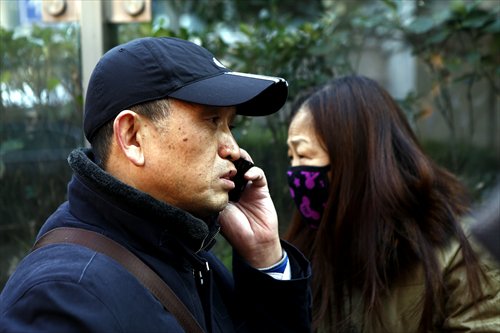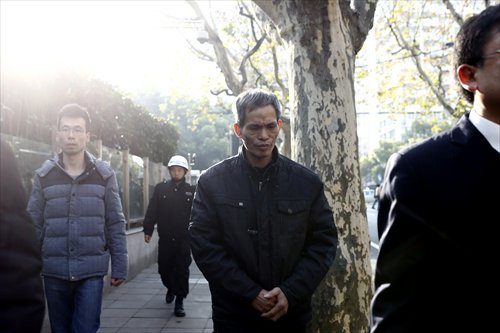HOME >> CHINA, METRO SHANGHAI
Murder or a prank?
By Ni Dandan Source:Global Times Published: 2014-12-9 17:53:01
Fudan poisoning case hearing packed with drama

Huang Yang's father outside the court Photo: Yang Hui/GT
Monday's hearing of the now notorious Fudan poisoning case was expected to be a day of formality, grief and sorrow but, for the people who had been queuing since 9 am to attend the Shanghai High People's Court, it was a day of shocks and drama.
In April 2013, 28-year-old Fudan University graduate student Huang Yang died after drinking from a water fountain in his dormitory. On February 18 this year, the Shanghai No.2 Intermediate People's Court sentenced Huang's roommate and fellow student Lin Senhao, 28, to death and deprived him of political rights for life. Lin appealed shortly after the sentence.
Lin's father, looking tired and stony-faced, arrived at the court accompanied by the family's lawyer. He ignored the crowds of media and cameramen and went straight inside without saying a word.
A little earlier the victim's parents had arrived. The father, Huang Guoqiang, appeared calm and answered some phone calls but his wife was obviously distressed and cried a little on her husband's shoulder. "We didn't get any sleep last night before this hearing. The Shanghai High People's Court is very close to Zhongshan Hospital where my son died. I have to stop thinking about it," he told reporters.
He had repeatedly emphasized, in the past, that there was no reason for his family to forgive Lin for what he had done to their child. Lin had shown no true regret in his letter of apology and continued to use the excuse that it was an April Fools' Day prank, he said. He had no idea that, later that day, lawyers would be suggesting that his son was not actually poisoned.
Hard to express
In the court Lin, who comes from Shantou, Guangdong Province, answered the lawyers' questions in a low voice with a pronounced Guangdong accent. Although he had been an excellent student and performed well academically, he often seemed to have difficulty expressing himself.
He told the court why he was appealing his conviction and sentence, stating that he had no motivation to kill his roommate and that he needed to clarify some things.
He said that the apparent poisoning of Huang was simply an April Fool's Day prank and it had been inspired by Huang himself who once told him about a prank where, if someone put the feet of a sleeping man into warm water, the sleeper would pee his bed. "I thought I would play a trick on him on the day. Huang Yang and I used to play tricks on each other, like I would suddenly tap him on his back to scare him."
Lin said someone had once asked him if he could use dimethylnitrosamine to poison people. "I was just curious how Huang would react but I didn't think he would be physically affected. I never imagined that Huang could die. I didn't really understand how this prank would turn out."
When Huang was taken to hospital, Lin believed that he was making a big fuss over nothing and even when Huang was transferred to the intensive care unit (ICU), Lin said he still believed that Huang could recover within two weeks based on his own lab experiments. "Dimethylnitrosamine causes initial damage to the liver but the liver can recover. Some of the lab rats I injected with the chemical recovered."
Lin told the court that because he hadn't considered the possible consequences, he later went and searched the Internet for answers, which showed that he hadn't intended to kill Huang.
The defendant also explained how he administered the poison. He said he put a small amount of the chemical into the water fountain. "But the water in the fountain turned yellow after I put the dimethylnitrosamine into it. I used my cup to bail out the extra yellow parts two or three times and then I diluted it more with two cups of water."
But prosecutors said that Lin's argument contradicted an earlier statement when he admitted that he had locked the dormitory door while putting the poison in the water fountain in case Huang returned or the students living opposite their dorm saw what he was doing. A prosecutor asked: "How could he avoid being noticed if he then went to the washroom for tap water? What he said is unbelievable."

Lin Senhao's father heads to the court on Monday morning. Photo: Yang Hui/GT
No protection
Defense lawyer Si Weijiang told the court Lin had no understanding of the nature of the chemical. "He didn't wear any protective clothing when he put the poison in the water. If he knew it was so poisonous, he would have worn a mask or gloves."
According to the police investigation, the students had not been getting along. At Monday's hearing Lin denied having any disagreements with Huang. "I had absolutely no antagonistic feelings about him. We never had a quarrel. I was not jealous of him. We didn't have an issue over a girl."
Rumors had suggested that Lin grew jealous of Huang who had been recommended to pursue a doctoral degree at Fudan. Lin said he had given up pursuing a doctoral degree himself because his family had limited finances.
Lin was calm for most of the hearing until his lawyer asked if he had anything to say to the family and friends of Huang. He suddenly burst into tears and couldn't speak for a while.
The case had been fairly predictable up to this point but then defense lawyer Si Weijiang sprang a major surprise on the court. He suggested that the amount of the chemical placed in the water fountain was not enough to kill. Further, he said, given that the dimethylnitrosamine was obtained many years before from an illegal producer, whether it was actually the substance people said it was was questionable.
Hu Zhiqiang is a medical legal expert who was called by the defense to testify. He told the court that, based on his analysis, Huang had died of acute viral hepatitis B. He said he had analyzed Huang's blood test reports from Zhongshan Hospital. "The poisoning and the acute hepatitis B could have happened more or less at the same time. I think there is a lack of evidence to prove Huang died of poisoning," said Hu, who has been a medical legal consultant for more than 30 years.
The prosecution queried his qualifications and he did admit that he wasn't authorized to analyze toxic substances. Prosecutors told the court that because Hu had not been involved in the autopsy, his conclusions, which were based on reports and paperwork, were not sustainable.
A second medical legal expert, Chen Yijiu, was then questioned in court. Chen, who had attended Huang Yang's autopsy, disputed Hu's conclusions, saying the hepatitis B indicators he referred to only showed two possibilities: one was that Huang had received a hepatitis B vaccination; or that he was recovering from a hepatitis B infection.
Chen said earlier medical tests had ruled out the possibility of liver damage caused by either hepatitis A, B or C. He insisted that it was the toxic chemical that had caused the acute liver damage which led to Huang's death.
The judge ruled that Hu's evidence would not be taken into account when the court delivered its final judgment. Hu objected loudly when this was announced.
In final arguments the defense lawyer Si Weijiang said he was not trying to argue that Lin was innocent but instead he was trying to present all the evidence to the court. "He should receive a punishment based on the crime he has committed. There should not be any privileged or different treatment," Si said.
Key questions
He said the three key questions in the case were: was poison actually involved; what was the real cause of Huang's death; and had Lin committed intentional homicide or just intended to injure?
Si said he personally believed Lin was guilty of intending to injure and should be sentenced to between 10 and 15 years in jail.
However the prosecutors said it couldn't be thus because they didn't accept that Lin had poisoned the water fountain as a prank. "The testimony of some of the witnesses proved that Lin did bear a grudge against Huang over some trivial matters. Putting this very toxic chemical in the water fountain showed how much he hated Huang."
The defense lawyer went on to question why police never revealed the specific dose of dimethylnitrosamine Huang received and, whether the amount was enough to kill.
Prosecution lawyers said that because the water fountain had been cleaned after the incident, it was hard to assess the exact the amount of dimethylnitrosamine involved. The prosecutors, with Huang's family's lawyers, asked the court to reaffirm its earlier judgment.
In a final statement in court, Lin apologized to Huang's parents and his own parents and he said he would do what he could to compensate Huang's family if he could survive prison. "If I'm gone, I hope you can all walk out of the shadows and live well." He thanked his defense lawyers who had worked for him for free.
During the hearing Lin's father cried out to him loudly twice in a local dialect before the judge warned him that he would be ejected if he did this again. Later the father said he was upset seeing his son stumble over his evidence. He said he was just telling his boy to be honest and straightforward.
The case is now effectively closed until the court delivers its judgment, which is not expected for a few months.
The background
On March 31, 2013, Lin Senhao brought the chemical from the Zhongshan Hospital laboratory to his dorm and injected it into the water fountain.
On April 1, 2013, Huang Yang drank from the water fountain. Although he spat his first mouthful out he soon began to feel acute stomach pains.
On April 2, 2013, Huang was hospitalized and tests showed he had liver damage.
On April 3, 2013, Huang was taken to ICU.
On April 11, 2013, the police interrogated Lin as the prime suspect.
On April 12, 2013, Lin was held in criminal detention.
On April 14, 2013, Huang was pronounced brain dead.
On April 16, 2013, Huang passed away at Zhongshan Hospital.
On April 25, 2013, Lin was formally arrested and charged with intentional homicide.
On November 27, 2013, the case was heard at the Shanghai No.2 Intermediate People's Court.
On February 18, 2014, Shanghai No.2 Intermediate People's Court sentenced Lin to death and deprived him of political rights for life.
In May 2014, a petition signed by 177 Fudan students begged the court not to execute Lin. The victim's father Huang Guoqiang said he couldn't accept this.
Posted in: Society, Metro Shanghai, City Panorama